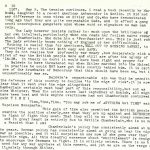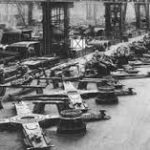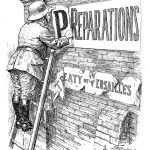Graham captures the omnipresent uncertainty and threats of the era as he opens this entry with the comment “the tension continues”. He focuses his attention this time to Martha Dodd – author of his most recent read, and daughter of the American Ambassador to Berlin between 1933 and 1937. Initially friendly with and socialising in Nazi circles, even meeting Hitler himself; Martha’s opinions changed as the regime’s intentions became clearer, especially after events such as “The Night of the Long Knives”. Occurring in June-July 1934, this was a purge of Nazi leaders and other political opponents, either through murder or arrest who were deemed too powerful or otherwise problematic. Martha adopted communist beliefs during this time and was engaged in espionage – becoming a Soviet spy and recruiting many others throughout her life including her second husband, Alfred Stern.
Thomas finds difficulty with her observations of Neville Chamberlain as being “pro-Fascist” and highlights the reality of how much the British public were opposed to becoming involved in another conflict after World War One. Despite the United States participating in the latter stages of the war, it appears that he felt that those outwith the principal nations involved in that war “do not realise how profoundly war weary, how desperately sick and tired of war the British people were and still are after the agiony (sic) of ’14-18”. Britain’s policy was of appeasement, and in the early 1930’s, working towards disarmament, but with the threat of Hitler becoming more apparent, opinions were changing.
As we have seen in previous entries, Graham is not supportive of former Prime Minister, Stanley Baldwin, but appreciates that taking the country into war earlier in the decade would have been very difficult due to the aforementioned feelings of the nation. It is his view however, that “Baldwin’s unpardonable sin was that he permitted the defences of this country to decline “to the edge of risk”. It is now clear that it went over the edge altogether!”
Rearmament was necessary and a programme was undertaken from 1934 until 1939, where substantial investment was required, as defence spending had decreased from £766 million after the Great War to £189 million in 1921-1922 and £102 million by 1932. During this time, the German military had grown to become the most powerful in the world, leaving British forces, as well as other nations, extremely inferior.
One example of this is that the combined allied air strength of Britain, France and Poland in September 1939 (3895 planes) paled in comparison to the number of German combat aircraft produced in that year alone (4733 aircraft), a figure which had increased significantly year on year since 1933. These figures supported Hitler’s boastful claim from September 1938 that Germany had “rearmed to an extent the like of which the world has not yet seen”. This rapid rearmament was one of the factors in Hitler’s popularity in Germany at this time, as unemployment rates reduced drastically against a backdrop of global Depression which the Nazi’s used to their advantage to encourage support for their government.
Sources used:
www.britannica.com
www.wikipedia.com
www.punch.photoshelter.com




